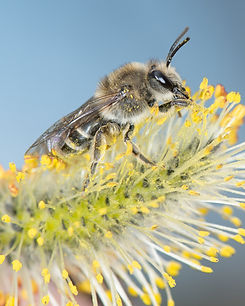Brachymelecta
Digger-Cuckoo Bees
In Minnesota, there is one described species within the genus Brachymelecta — Brachymelecta interrupta. Bees in this genus are cleptoparasitic (cuckoo bees), and their hosts include bees in the genus Anthophora. Anthophora walshii, a ground-nesting digger bee, is the likely host for Brachymelecta interrupta in Minnesota.
Brachymelecta interrupta is a dark brown or black bee with thick black antennae and interrupted yellow to rusty-orange flattened hair bands on the abdomen. This species has dark wings with a small light-colored area by the second recurrent vein, three forewing submarginal cells, and an arolium (pad between the tarsal claws) on all tarsi. Females lack pollen-collecting structures on their hind legs. This cuckoo bee is medium-sized and ranges in length from 10 to 13 mm (0.39 to 0.6 inches).

Brachymelecta interrupta
Phenology

1
no. species
in MN
size range


Wing
position
on flowers
Distribution

Regional Map
Brachymelecta interrupta (Cresson, 1872) in GBIF Secretariat (2023). GBIF Backbone Taxonomy. Checklist dataset https://doi.org/10.15468/39omei accessed via GBIF.org on 2024-12-20.
Plant
Associations
Dalea spp.
(prairie clover)
Rudbeckia hirta
(black-eyed Susan)
Pycnanthemum spp.
(mountain mint)



Coreopsis palmata
(prairie coreopsis)
Monarda spp.
(bergamot, horsemint)


Explore More Apidae Genera
Explore Bee Families

Apidae
15 genera, 133 species
Bumble bees Bombus
Longhorn bees
Epimelissodes, Eucera, Melissodes
Carpenter bees
Ceratina, Xylocopa
Honey bees Apis
Digger bees Anthophora
Cuckoo bees Brachymelecta, Epeolus, Holcopasites, Nomada, Neolarra, Triepeolus
Squash bees Xenoglossa

2 genera, 39 species
Halictidae
10 genera, 134 species
Metallic green sweat bees
Agapostemon, Augochlora, Augochlorella, Augochloropsis
Large sweat bees
Dieunomia, Nomia
Short-faced bees Dufourea
Sweat bees Halictus
Small sweat bees Lasioglossum
Cuckoo (blood) bees Sphecodes
Megachilidae
14 genera, 86 species
Resin and pebble bees Anthidiellum, Dianthidium, Heriades, Paranthidium
Carder bees Anthidium, Pseudoanthidium
Mock orange bees Chelostoma
Mason bees Osmia, Hoplitis
Leafcutter bees Megachile
Sharp-tailed cuckoo bees Coelioxys
Dark cuckoo bees Stelis

Citations and Further Reading
Gibbs, J., Hanuschuk, E., Miller, R., Dubois, M., Martini, M., Robinson, S., ... & Onuferko, T. M. (2023). A checklist of the bees (Hymenoptera: Apoidea) of Manitoba, Canada. The Canadian Entomologist, 155, e3.
Mitchell, T. B. (1960). Bees of the eastern United States. Technical Bulletin No. 141. North Carolina Agricultural Experiment Station.
Onuferko, T. M., Packer, L., & Genaro, J. A. (2021). Brachymelecta Linsley, 1939, previously the rarest North American bee genus, was described from an aberrant specimen and is the senior synonym for Xeromelecta Linsley, 1939. European journal of taxonomy, 754, 1-51.
Portman, Z. M., Gardner, J., Lane, I. G., Gerjets, N., Petersen, J. D., Ascher, J. S., ... & Cariveau, D. P. (2023). A checklist of the bees (Hymenoptera: Apoidea) of Minnesota. Zootaxa, 5304(1), 1-95.
Wilson, J. S., & Messinger Carril, O. J. (2016). The bees in your backyard: a guide to North America's bees. Princeton University Press.




















